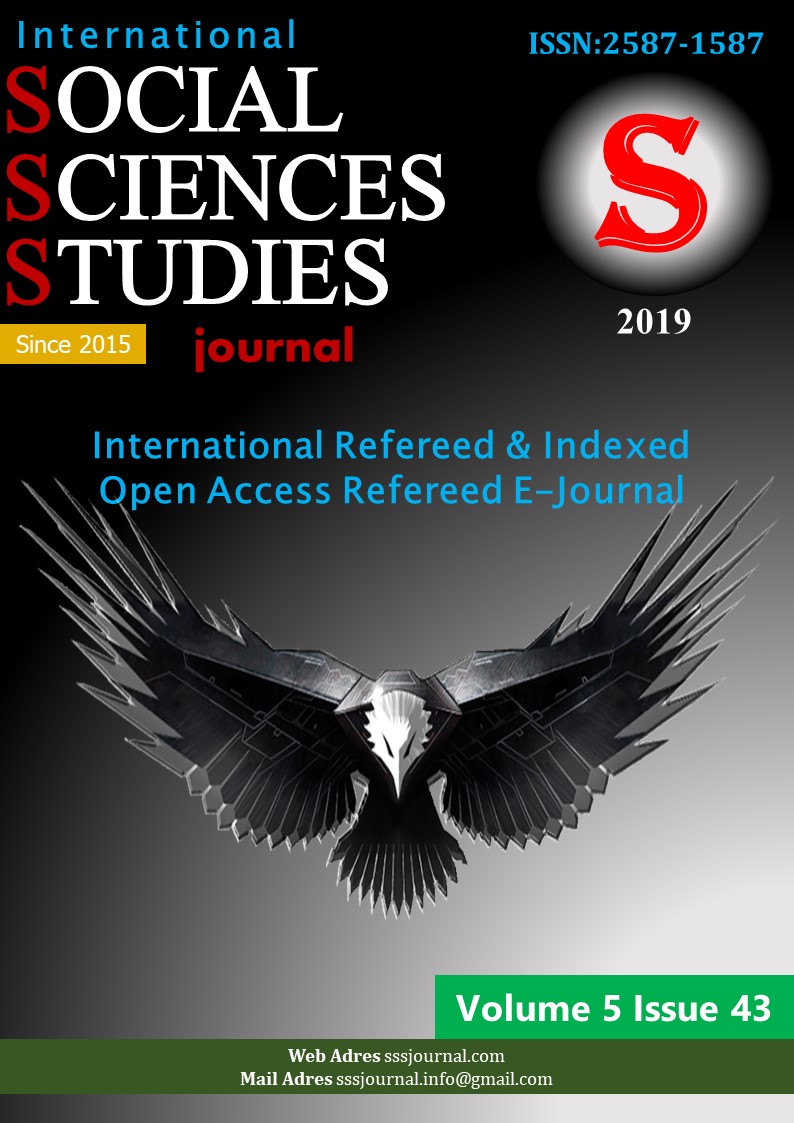Ailelerin Çocuklarını Yüzme Kurslarına Gönderme Sebepleri ve Bu Sebeplerin Çeşitli Değişkenlere Göre İncelenmesi
Author :
Abstract
Bu çalışmanın amacı, ailelerin çocuklarını yüzme kurslarına gönderme sebeplerini belirlemektir. Araştırmanın evrenini Balıkesir ilinde çocuklarını yüzme kurslarına gönderen aileler oluşturmaktadır. Örneklem grubunu, çocuklarını Balıkesir ilinde yaz okulu yüzme kurslarına gönderen 130 kadın 95 erkek veli oluşturmaktadır. Araştırmada veri toplama aracı olarak araştırmacı tarafından oluşturulan kişisel bilgi formu ve Meral (2010) tarafından geliştirilen Ailelerin Çocuklarını Spora Yönlendirme Sebeplerini ölçen anket formu kullanılmıştır. Anket formu 5’li likert tipinde olup ailelerin çocuklarını spora yönlendirme sebeplerini ölçen 11 maddeden oluşmaktadır. Veri toplama işleminden sonra, elde edilen verilerin analizleri için SPSS 25 paket programı kullanılmıştır. Verilerin normal dağılıp dağılmadığını belirlemek için Shapiro Wilk-W testi uygulanmış ve verilerin normal dağılım göstermediği tespit edilmiştir. Dolayısı ile yapılacak olan analizlerde parametrik olmayan test yöntemleri kullanılmıştır. Anketteki maddelerinin güvenirlik analizi için Cronbach’s Alpha değeri 0,69 olarak hesaplanmış, anketin güvenilir olduğu tespit edilmiştir. Araştırmaya katılan velilerin çocuklarını yüzme kursuna gönderme sebeplerinde “Boş zamanlarını etkin olarak değerlendirmesine neden olur.” maddesinin en yüksek ortalamaya sahip olduğu (M=4,82), “Maddi kazanç elde etmesine yardımcı olur” (M=2,55) maddesinin de en düşük ortalamaya sahip oluduğu tespit edilmiştir. Araştırmaya katılan velilerin cinsiyet değişkeni ile çocuklarını yüzme kursuna gönderme sebepleri arasında istatistiksel olarak anlamlı bir faklılık tespit edilememiştir (p=,97). Araştırmaya katılan velilerin yaş değişkeni incelendiğinde 50 yaş ve üzeri olan velilerin çocuklarını yüzme kursuna gönderme sebelerinin ortalamasının daha yüksek olduğu, 22-25 yaş aralığında olan velilerin ise daha düşük ortalamaya sahip olduğu tespit edilmiştir (p=,002). Velilerin eğitim değişkeni ile çocuklarını yüzme kursuna gönderme nedenleri incelendiğinde lisansüstü eğitim görmüş olan velilerin çocuklarını yüzme kursuna gönderme sebeplerinin ortalamasının daha yüksek olduğu, ilkokul mezunu olan velilerin ise en düşük ortalamaya sahip olduğu tespit edilmiştir (p=,000).
Keywords
Abstract
The aim of this study is to determine the reasons why parents send their children to swimming courses. The universe of the research consists of families who send their children to swimming courses in Balıkesir province. The sample group consists of 130 female and 95 male parents who send their children to summer school swimming courses in Balıkesir province. A personal data form created by the researcher and a questionnaire developed by Meral (2010) were used as a data collection tool. The questionnaire is of 5 likert type and consists of 11 items that measure the reasons parents refer their children to sports. After data collection, the SPSS 25 package program was used to analyze the data obtained. To determine if the data is normally distributed, a Shapiro Wilk-W test was applied and it was determined that the data did not show normal distribution. Therefore, non-parametric test methods were used in the analysis. Cronbach's Alpha value was calculated as 0.69 for the reliability analysis of the items in the survey and it was determined that the survey was reliable. It causes parents who participated in the study to effectively evaluate their children “leisure time for reasons of sending them to a swimming course. it was found that the article “helps to achieve material gain” (M=2.55) also has the lowest average. There was no statistically significant difference between the gender variable of the parents involved and the reasons for sending their children to swimming courses (p=,97). When the age variable of the parents who participated in the study was examined, it was determined that the average of the parents who were 50 years of age and over had a higher average of sending their children to swimming courses, while the parents who were in the age range of 22-25 had a lower average (p=, 002). Parents ' reasons for sending their children to swimming courses with education variables were examined and it was determined that the average of parents who had Graduate Education sent their children to swimming courses was higher, while parents who had primary school graduates had the lowest average (p=,000).
Keywords
- Coakley, J. (1993). Social Dimensions of İntensive Training and Participation in Youth Sports, İntensive
- Coakley, J. (1993). Social Dimensions of İntensive Training and Participation in Youth Sports, İntensiveParticipation in Children's Sports, Cahili, BR and Pearl. AJ, Human Kinetics Publishers, Champaign, 77.
- Esen S. A. (2010). İlköğretġm Okullarında Okuyan Ve Voleybol Sporcusu Olmayı Seçen Öğrencilerin BuSeçimlerindeki Nedenler Ve Okul, Aile, Toplum Faktörlerinin Etkisi. Yüksek Lisans Tezi. Marmara Üniversitesi, Eğitim Bilimleri Enstitüsü.
- Güven Ö., Öncü E., (2006). Beden Eğitimi ve Spora Katılımda Aile Faktörü. Aile ve Toplum Eğitim Kültür Araştırma Dergisi. 10(10), 81-90.
- Keskin V. (2006). Çocuklarını Spora Yönlendiren Anne ve Babaların Beklentileri. Yüsek Lisans Tezi. Afyon Kocatepe Üniversitesi, Sağlık Bilimleri Enstitüsü.
- Kilci A.K., Göktaş Z., (2018). Sosyal Medya Kullanımının Spor Kanallarının İzlenmesi Üzerindeki Etkisi ve Kanal Seçimindeki Rolü. Social Sciences Journal. 4(18), 1888-1903.
- Kotan, Ç., Hergüner, G., & Yaman, Ç. (2009). İlköğretim Okullarında Okuyan Sporcu Öğrencilerin SporYapmalarında Okul ve Aile Faktörünün Etkisi (Sakarya İl Örneği).Niğde Üniversitesi Beden Eğitimi ve Spor Bilimleri Dergisi, 3(1), 49-58.
- Meral, S. (2010). Ailelerin Çocuklarını Futbol Okullarına Gönderme Sebeplerinin Araştırılması. Yüksek Lisans Tezi. Marmara Üniversitesi, Sağlık Bilimleri Enstitüsü.
- Özsandıkçı, K. (2010). Yüzme Sporuna Katılımda Ailenin Etkisinin İncelenmesi. Yüksek Lisans Tezi. Karadeniz Teknik Üniversitesi, Sosyal Bilimler Enstitüsü.
- Öztürk, H., Adnan, A., & DAMAR, D. (2016). Velilerin çocuklarını basketbol okullarına gönderme sebeplerinde etkili olan nedenlerin tespiti. CBÜ Beden Eğitimi ve Spor Bilimleri Dergisi, 11(1), 1-12.
- Seraslan, M. Z. (1990). Spor Pazarlaması: Sporun T opluma Yaygınlaştırılmasında PazarlamaTekniklerinde Yaralanma. İstanbul, İstanbul Üniversitesi Sosyal Bilimler Enstitüsü (Doctoral dissertation, Doktora Tezi).
- Sezen Y, Sosyolojide ve Din Sosyolojisinde Temel Bilgiler ve Tartışmalar, M.Ü.Ġ.F.V Yayınları, s.117, İstanbul, 1990.
- Yücel, O., Keskin, V., Tortop, Y., & Gölünük, S., (2011). Çocuklarını Yaz Spor Okullarına GönderenAilelerin Sosyo-Ekonomik Durumları Ve Beklentileri. Spor ve Performans Araştırmaları Dergisi, 2(1), 13- 22.





